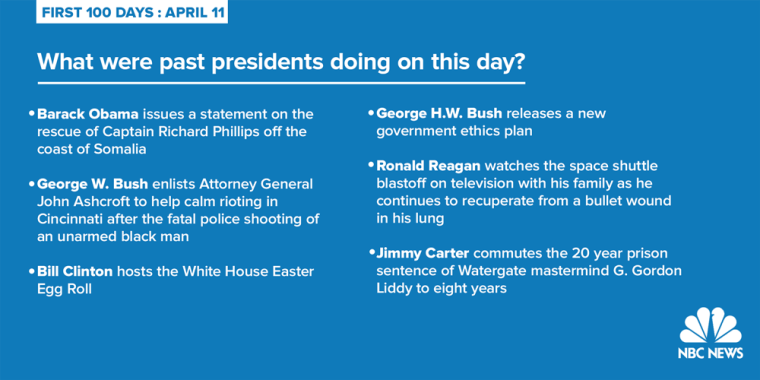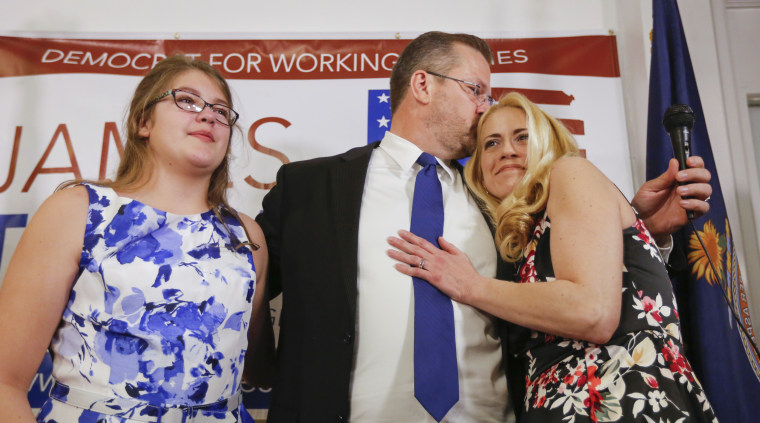First Read is your briefing from Meet the Press and the NBC Political Unit on the day's most important political stories and why they matter
What we learned from the Kansas special election
There were three potential outcomes for yesterday’s unexpectedly competitive special election in Kansas. 1) A GOP blowout that would have thrown cold water on talk of a huge anti-Trump realignment; 2) A narrow Democratic win (or even a near-win) that would have been viewed as a political earthquake akin to Scott Brown’s 2010 special election win in Massachusetts; or 3) a single-digit Democratic loss that would serve as a warning shot — but not quite a panic button — for the GOP. We got Option Three, with Republican Ron Estes ultimately pulling to a 53-46 lead over Democrat James Thompson. Democrats are painting the close race in this heavily Republican district as a win for the party; after all, it’s no small feat that Thompson outperformed the 2016 presidential margin here by 20 points. (Dems can also take heart from the enthusiasm demonstrated by Thompson’s strong showing in the early and absentee vote tally from the district’s largest county — an early advantage that was large enough to make the race look like a true squeaker until Estes’ robust rural and Election Day performance came into focus late in the evening.) For their part, national Republicans can breathe a sigh of relief that their late blitz in the district paid off.
Ultimately, this contest turned out where both sides privately thought it would as of yesterday. But it’s striking that it was this close, and it was certainly suspenseful enough to give a jolt to both sides heading into the closely-watched Georgia House special election primary next week.
Eyes on Montana?
In the latest example ofliberal donors pumping cash into red-state contests, Montana Democratic House candidate and folk singer Rob Quist announced Tuesday that he’s raised a total of $1.3 million so far for his race. Quist, a Bernie Sanders supporter, is up against GOP candidate and tech entrepreneur Greg Gianforte in another congressional race that could be more competitive than the state’s past election history would indicate. Democrats have lost each of the last eleven elections for U.S. House in Montana, but it’s also true that they’ve proved they can win statewide in Senate and governors’ races. And Quist (while he has some personal financial baggage that shouldn’t be dismissed) could make things interesting. National Republicans are getting involved here too; Donald Trump Jr. is slated for a four-city tour of the state to campaign for Gianforte later this month. Next week, Georgia will be in the spotlight, but don’t let Montana’s May 25 election fall off your radar either.
Trump on Steve Bannon: ‘I’m my own strategist’
In an interview with the New York Post Tuesday, Donald Trump had this to say about chief strategist Steve Bannon: “I like Steve, but you have to remember he was not involved in my campaign until very late. I had already beaten all the senators and all the governors, and I didn't know Steve. I’m my own strategist, and it wasn't like I was going to change strategies because I was facing crooked Hillary.” And, Trump added, Bannon’s on notice when it comes to the feuding between factions in the White House. “Steve is a good guy, but I told them to straighten it out or I will,” he said. It’s more than a bit dubious for Trump to claim he didn’t know Bannon until late in the campaign, and it’s got a whiff of the White House’s earlier eyebrow-raising attempts to downplay Paul Manafort’s onetime role at the top of Trump’s orbit. Ouch.
Words Matter, Part One (Spicer Edition)
White House press secretaries have a tough job. Briefings are live, they’re often combative, and every word is dissected both by the press and by your boss. But we can’t say we’ve ever seen an unforced error quite like Sean Spicer’s statements about Syria, Assad and the Holocaust yesterday.
- The original statement: “We didn’t use chemical weapons in World War II. You know you had a, you know someone who is as despicable as Hitler, who didn’t even sink to -- to using chemical weapons.”
- The follow-up statement in the briefing when asked to clarify: “I think when you come to Sarin gas there was no, he was not using the gas on his own people the same way that Assad is doing… He brought them into the Holocaust center and I understand that, but I’m saying in the way that Assad used them where he went into towns, dropped them down to innocent into the middle of towns.”
- The first written clarification: “In no way was I trying to lessen the horrendous nature of the Holocaust, however, I was trying to draw a contrast of the tactic of using airplanes to drop chemical weapons on innocent people."
- The second written clarification: “In no way was I trying to lessen the horrendous nature of the Holocaust, however, I was trying to draw a contrast of the tactic of using airplanes to drop chemical weapons on population centers.”
- The third written clarification: "In no way was I trying to lessen the horrendous nature of the Holocaust. I was trying to draw a distinction of the tactic of using airplanes to drop chemical weapons on population centers. Any attack on innocent people is reprehensible and inexcusable."
Spicer eventually gave a full apology, calling his comments "inappropriate and inexcusable.” But particularly for a White House that’s already struggled with accusations of insensitivity towards the Jewish people, this was truly a mess. And aside from prompting lots of backlash, it also sows even more confusion about where the United States stands on Assad. Asserting that Assad is in some ways worse than Hitler — while also declining to fully outline the steps the United States is willing to take to stop him? That’s hardly a good position, and it was an entirely unavoidable error.
Words Matter, Part Two (Tillerson Edition)
Don’t miss this reportedly offhand comment from Secretary of State Rex Tillerson yesterday. Per Bloomberg: “’Why should U.S. taxpayers be interested in Ukraine?’ Tillerson asked foreign ministers discussing Russia’s intervention there at a Group of Seven gathering Tuesday in Lucca, Italy… [T]he provocative remark suggested Tillerson, the former chief of Exxon Mobil Corp., is still finding his footing in a world of diplomacy where even passing remarks are parsed for deeper meaning. The question was sure to give pause to any European official fearful that President Donald Trump might ease sanctions and let the former Soviet state slip back into it Russia’s orbit, even as tensions with Moscow are running high.” A Tillerson aide downplayed the remark, but it’s another example of how careless language from Trump officials can sow anxiety and confusion when the stakes are very high indeed.
The FBI’s FISA warrant to monitor Trump adviser Carter Page
Don’t miss this scoop last night from the Washington Post: “The FBI obtained a secret court order last summer to monitor the communications of an adviser to presidential candidate Donald Trump, part of an investigation into possible links between Russia and the campaign, law enforcement and other U.S. officials said. The FBI and the Justice Department obtained the warrant targeting Carter Page’s communications after convincing a Foreign Intelligence Surveillance Court judge that there was probable cause to believe Page was acting as an agent of a foreign power, in this case Russia, according to the officials.” Page told NBC News late Tuesday that he’s been targeted by the “Clinton/Obama regime,” saying that he’s “happy” to see confirmation that he was monitored.
Trump's Day
Trump meets with House Judiciary Chairman Bob Goodlatte in the morning. In the afternoon, he holds a meeting and joint press conference with Secretary General Jens Stoltenberg of NATO.
What were other presidents doing on April 12?




